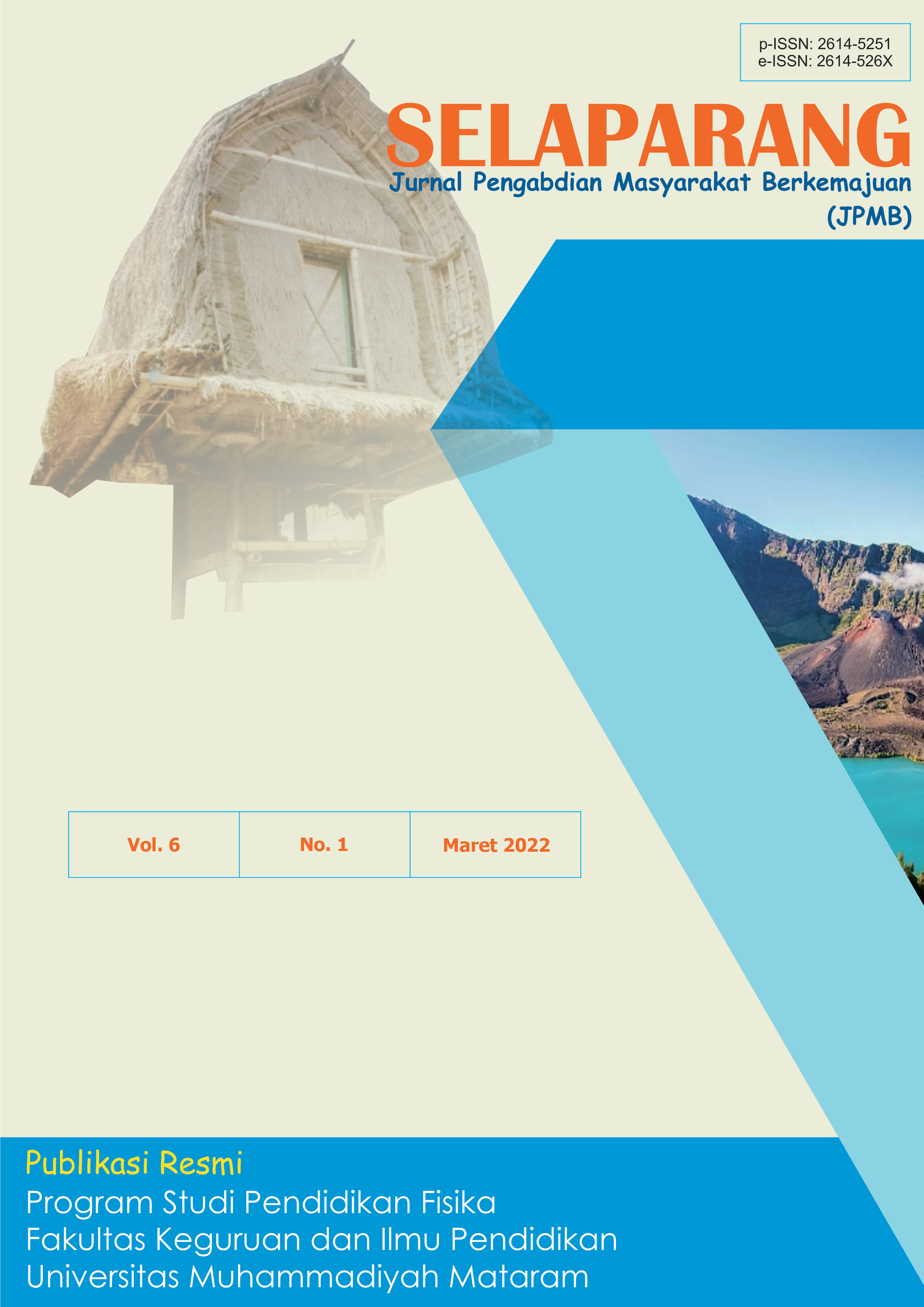PENGUATAN KAPASITAS MASYARAKAT MELALUI PENDEKATAN PENGEMBANGAN PARIWISATA DESA BAHARI III KABUPATEN BUTON SELATAN
DOI:
https://doi.org/10.31764/jpmb.v6i1.7330Keywords:
development, capacity, tourist, bahari III.Abstract
ABSTRAK
Tujuan pengabdian masyarakat ini untuk memperkuat kapasitas masyarakat dalam pengembangan pariwisata berbasis partisipasi masyarakat berkaitan erat dengan pemberdayaan dan pengembangan kepariwisataan yang berkelanjutan. Desa Bahari III menjadi salah satu ikon pariwisata pesisir bagi Kabupaten Buton Selatan, dengan ciri kawasan pesisir, masyarakat yang memegang teguh adat istiadat dan kondisi sosial ekonomi masyarakat yang turut mendukung hal itu. Namun, pengembangan pariwisata yang kini dilakukan belum menempatkan masyarakat sebagai subjek kebijakan pengembangan pariwisatanya. Pendekatan yang menempatkan partisipasi kelompok masyarakat dalam pengembangan pariwisata, yang dilakukan dengan tujuan untuk meningkatkan standar kehidupan masyarakat. Tujuan pengabdian masyarakat ini adalah membentuk dasar untuk mendefinisikan model pariwisata berbasis masyarakat yang terdapat di Desa Bahari III. Dengan begitu, pengabdian masyarakat ini digunakan untuk mendeskripsikan kondisi ekonomi desa, partisipasi masyarakat yang memungkinkan adanya kolaborasi dan penciptaan modal sosial. Melalui pengabdian ini dapat menunjukkan bagaimana model ini dapat digunakan untuk menilai tingkat partisipasi masyarakat terkait pariwisata, dan menyarankan tindakan lebih lanjut yang diperlukan.
Â
Kata kunci: pengembangan; kapasitas; pariwisata; bahari III.
Â
ABSTRACT
The purpose of this community service is to strengthen community capacity in community participation-based tourism development which is closely related to empowerment and sustainable tourism development. Desa Bahari III has become one of the icons of coastal tourism for South Buton Regency, with the characteristics of a coastal area, people who adhere to customs and the socio-economic conditions of the people who support it. However, the tourism development that is currently being carried out has not placed the community as the subject of its tourism development policy. An approach that places community group participation in tourism development, which is carried out with the aim of improving people's living standards. The purpose of this community service is to form the basis for defining the community-based tourism model found in Bahari III Village. That way, this community service is used to describe the economic condition of the village, community participation that allows collaboration and the creation of social capital. Through this service, we can show how this model can be used to assess the level of community participation in tourism, and suggest further actions that are needed.
Â
Keywords: development; capacity; tourist; bahari III.
References
Afrianti, W., Rostina, R., Ilham, L. O. M., Ningsih, E. S., Putra, M. R. A., & Lawelai, H. (2020). DESA WISATA MENJADI KEKUATAN BARU EKONOMI DESA. INTEGRITAS : Jurnal Pengabdian. https://doi.org/10.36841/integritas.v4i2.576
Arsik, Selfianti Faisal; Lawelai, H. (2020). Penerapan Akuntabilitas, Efektivitas, dan Transparansi dalam Mewujudkan Good Governance: Studi Pemerintah Desa Banabungi. JSIP: Jurnal Studi Ilmu Pemerintahan, 1(1), 1–7. http://www.tjyybjb.ac.cn/CN/article/downloadArticleFile.do?attachType=PDF&id=9987
Lawealai, H. (2021). Analysis of Local Government Strategies in Capacity Building for Regional Financial , Asset, and Revenue Management Bodies in Baubau City , Indonesia. International Journal Of Science, Technology & Management, VOL. 2 NO., 61–73. https://doi.org/https://doi.org/10.46729/ijstm.v2i1.137
Matilainen, A., Suutari, T., Lähdesmäki, M., & Koski, P. (2018). Management by boundaries – Insights into the role of boundary objects in a community-based tourism development project. Tourism Management. https://doi.org/10.1016/j.tourman.2018.02.003
Okazaki, E. (2008). A community-based tourism model: Its conception and use. In Journal of Sustainable Tourism. https://doi.org/10.2167/jost782.0
PM. (2010). PM.26/UM.001/MKP/2010. PEDOMAN UMUM PROGRAM NASIONAL PEMBERDAYAAN MASYARAKAT (PNPM) MANDIRI PARIWISATA MELALUI DESA WISATA DENGAN. https://doi.org/10.1017/CBO9781107415324.004
Rizkianto, N, T. T. (2018). PENERAPAN KONSEP COMMUNITY BASED TOURISM DALAM PENGELOLAAN DAYA TARIK WISATA BERKELANJUTAN (Studi Pada Desa Wisata Bangun. Administrasibisnis.Studentjournal.Ub …, 58(2), 20–26.
Sharpley, R. (2000). Tourism and sustainable development: Exploring the theoretical divide. Journal of Sustainable Tourism. https://doi.org/10.1080/09669580008667346
Syarifuddin. (2018). The Implementation of Community Based Tourism Concept In the Management of Natural Tourism in Kampoeng Karts Rammang-Rammang Maros Regency. UNM Geographic Journal, 2(1), 74–83.
Wijaya, A. A. M. (2016). Modal Sosial Untuk Kapasitas Community Governance (Studi Kasus Perempuan Pesisir Kelurahan Sulaa Kota Baubau). Jurnal Ilmu Pemerintahan : Kajian Ilmu Pemerintahan Dan Politik Daerah, 1(1), 107. https://doi.org/10.24905/jip.v1i1.436
Wulan, T. R. (2007). Ekofeminisme Transformatif : Alternatif Kritis. Jurnal.Ipb.Ac.Id, 01(01), 105–130.
Downloads
Published
Issue
Section
License
The copyright of the received article shall be assigned to the journal as the publisher of the journal. The intended copyright includes the right to publish the article in various forms (including reprints). The journal maintains the publishing rights to the published articles.

Selaparang : Jurnal Pengabdian Masyarakat Berkemajuan is licensed under a Creative Commons Attribution-ShareAlike 4.0 International License.

